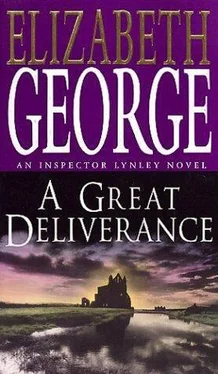Elizabeth George - A Great Deliverance
Здесь есть возможность читать онлайн «Elizabeth George - A Great Deliverance» весь текст электронной книги совершенно бесплатно (целиком полную версию без сокращений). В некоторых случаях можно слушать аудио, скачать через торрент в формате fb2 и присутствует краткое содержание. Жанр: Триллер, на английском языке. Описание произведения, (предисловие) а так же отзывы посетителей доступны на портале библиотеки ЛибКат.
- Название:A Great Deliverance
- Автор:
- Жанр:
- Год:неизвестен
- ISBN:нет данных
- Рейтинг книги:4 / 5. Голосов: 2
-
Избранное:Добавить в избранное
- Отзывы:
-
Ваша оценка:
- 80
- 1
- 2
- 3
- 4
- 5
A Great Deliverance: краткое содержание, описание и аннотация
Предлагаем к чтению аннотацию, описание, краткое содержание или предисловие (зависит от того, что написал сам автор книги «A Great Deliverance»). Если вы не нашли необходимую информацию о книге — напишите в комментариях, мы постараемся отыскать её.
A Great Deliverance — читать онлайн бесплатно полную книгу (весь текст) целиком
Ниже представлен текст книги, разбитый по страницам. Система сохранения места последней прочитанной страницы, позволяет с удобством читать онлайн бесплатно книгу «A Great Deliverance», без необходимости каждый раз заново искать на чём Вы остановились. Поставьте закладку, и сможете в любой момент перейти на страницу, на которой закончили чтение.
Интервал:
Закладка:
“Anything peculiar inside?”
“Nothing at all. It was perfectly clean, as it always was. There was, however…” His eyes shifted to the window. How to explain?
“Yes?”
“The candles had burned down.”
“Have they no electricity?”
Father Hart looked at them earnestly. “These are votive candles. They were always lit. Always. Twenty-four hours a day.”
“For a shrine, you mean?”
“Yes, that’s exactly what it is. A shrine,” he agreed immediately and hurried on. “When I saw that, I knew at once something was wrong. Neither William nor Roberta would ever have let the candles go out. So I went through the house. And from there, out to the barn.”
“And there…?”
What was there really left to report? The chilling tranquillity had told him at once. Outside, in the near pasture, the bleating of sheep and the cry of birds spoke of sanity and peace. But in the barn, the absolute quiet was the core of diablerie. Even from the door the rich cloying smell of pooled blood had reached him, over the mixed odours of manure and grain and rotting hay. It had drawn him forward with seductive, unavoidable hands.
Roberta had been sitting on an overturned pail in one of the stalls, a big girl born of her father’s stock, used to the labour of a farm. She was motionless, staring not at the headless monstrosity that lay at her feet but at the opposite wall and at the cracks that mapped its surface.
“Roberta?” he had called urgently. He felt sickness rising from stomach to throat and his bowels loosening.
There was no response, not a breath, not a movement. Just the sight of her broad back, her sturdy legs curled beneath her, the axe at her side. And then, over her shoulder, he’d seen the body clearly for the fi rst time.
“I did it. I’m not sorry,” the only thing she’d said.
Father Hart squeezed his eyes shut against the memory. “I went at once to the house and rang Gabriel.”
For a moment Lynley believed that the priest was talking about the archangel himself. The odd little man did seem a bit in touch with other worlds as he sat there painfully struggling through his story.
“Gabriel?” Webberly asked incredulously. Lynley could tell that the super’s patience was wearing thin. He fingered through the report for some indication of the name and found it quickly enough.
“Gabriel Langston. Village constable,” he said. “And I take it, Father, that Constable Langston phoned the Richmond police at once?”
The priest nodded. He looked warily at Lynley’s cigarette case and the other man opened it and offered another round. Havers refused and the priest was about to do so as well until Lynley took one himself. His throat felt raw, but he knew they’d never get to the end of the story unless the cleric was supplied with nicotine, and it appeared that he needed a companion in his vice. Lynley swallowed uncomfortably, longed for a whisky, lit up again, and let the cigarette burn itself to nothing in the ashtray.
“Police came down from Richmond. It was all very quick. It was…they took Roberta.”
“Well, what could you expect? She admitted to the crime.” Havers had spoken. She’d risen from her seat and wandered to the window. Her voice clearly informed them that in her opinion they were wasting their time with this foolish old man, that they ought to be barrelling towards the North at this very moment.
“Lots of people admit to crimes,” Webberly said, motioning her back to her seat. “I’ve had twenty-five confessions to the Ripper killings so far.”
“I just wanted to point out-”
“That can come later.”
“Roberta didn’t kill her father,” the priest went on as if the other two had not spoken. “It’s just not possible.”
“But family crimes happen,” Lynley said gently.
“Not when there’s whiskers.”
To the priest’s bizarre comment-so obviously logical and satisfactory to himself-no one made a response. No one spoke at all or looked particularly at anyone else. There was a lengthy, unendurable pause in the proceedings, broken by Webberly, who pushed away from the table. “ Jesus ,” he muttered. “I’m terribly sorry, but…” He stalked to a cabinet at the corner of the room and pulled out three bottles. “Whisky, sherry, or brandy?” he asked the others.
Lynley sent a prayer of thanksgiving to Bacchus. “Whisky,” he replied.
“Havers?”
“Nothing for me,” she said primly. “I’m on duty.”
“Yes, of course. Father, what’ll it be?”
“Oh, a sherry would be only too-”
“Sherry it is.” Webberly tossed back a small, neat whisky before pouring again and returning to the table.
They all stared meditatively into their glasses, as if each wondered who’d be the fi rst to ask the question. Lynley finally did so, his throat newly soothed by the fragrant single malt. “Ah…whiskers?” he prompted.
Father Hart looked down at the papers spread out on the table. “Isn’t it in the report?” he asked plaintively. “About the dog?”
“Yes, it does mention the dog.”
“That was Whiskers,” the priest explained, and sanity was restored.
There was collective relief. “It was dead in the stall with Teys,” Lynley noted aloud.
“Yes, don’t you see? That’s why we all of us know Roberta’s innocent. Aside from the fact that she was devoted to her father, there’s Whiskers to consider. She would never hurt Whiskers.” Father Hart eagerly sought out the words to explain. “He was a farm dog, part of the family since Roberta was five. He was retired, of course, a bit blind, but one just doesn’t put down dogs like that. Everyone in the village knew Whiskers. He was a bit of a pet to all of us. He’d wander down of an afternoon to Nigel Parrish’s house on the common, have a bit of a lie in the sun whilst Nigel played the organ (he’s our organist at church, you see). Or sometimes he’d have his tea at Olivia’s.”
“Got on with the duck, did he?” Webberly asked, straight-faced.
“Oh, famously!” Father Hart beamed. “Whiskers got on with us all. And when Roberta was out and about he followed her everywhere. That’s why, when they took Roberta, I had to do something. And here I am.”
“Yes, indeed, here you are,” Webberly concluded. “You’ve been more than helpful, Father. I believe Inspector Lynley and Sergeant Havers have all that they need for now.” He got to his feet and opened the door of his offi ce. “Harriman?”
The Morse-like tapping of word processor keys stopped. A chair scraped on the fl oor. Webberly’s secretary popped into the room.
Dorothea Harriman bore a modest resemblance to the Princess of Wales, which she emphasised to a disconcerting degree by tinting her sculptured hair the approximate shade of sunlight on wheat and refusing to wear her spectacles in the presence of anyone likely to comment upon the Spencerian shape of her nose and chin. She was eager to advance, swept up in her “c’reer,” as she monosyllabically called it. She was intelligent enough to make a success of her job and would most likely do so, especially if she could bring herself to renounce her distracting manner of dress, which everyone referred to as Parody Princess. Today she was wearing what looked like a drop-waisted pink ball gown that had been shortened for everyday wear. It was utterly hideous.
“Yes, Superintendent?” she asked. In spite of threats and imprecations, Harriman insisted upon calling every employee at the Yard by his or her full title.
Webberly turned to the priest. “Are you staying in London, Father, or returning to Yorkshire?”
“I’m on the late train back. Confessions were this afternoon, you see, and as I wasn’t there, I did promise to have them until eleven tonight.”
Читать дальшеИнтервал:
Закладка:
Похожие книги на «A Great Deliverance»
Представляем Вашему вниманию похожие книги на «A Great Deliverance» списком для выбора. Мы отобрали схожую по названию и смыслу литературу в надежде предоставить читателям больше вариантов отыскать новые, интересные, ещё непрочитанные произведения.
Обсуждение, отзывы о книге «A Great Deliverance» и просто собственные мнения читателей. Оставьте ваши комментарии, напишите, что Вы думаете о произведении, его смысле или главных героях. Укажите что конкретно понравилось, а что нет, и почему Вы так считаете.












